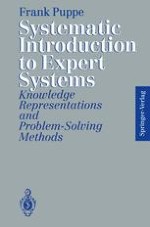1993 | OriginalPaper | Buchkapitel
Least-Commitment Strategy
verfasst von : Frank Puppe
Erschienen in: Systematic Introduction to Expert Systems
Verlag: Springer Berlin Heidelberg
Enthalten in: Professional Book Archive
Aktivieren Sie unsere intelligente Suche, um passende Fachinhalte oder Patente zu finden.
Wählen Sie Textabschnitte aus um mit Künstlicher Intelligenz passenden Patente zu finden. powered by
Markieren Sie Textabschnitte, um KI-gestützt weitere passende Inhalte zu finden. powered by
Like the propose-and-revise strategy, the least-commitment strategy is suitable for deriving the values of a set of parameters, but it avoids a rapid, temporary, heuristic determination of parameter values. In particular, there are no loops to be broken as is Fig. 23.1. The knowledge about the relationships between the parameters is represented in the form of undirected constraints instead of directed rules. The least-commitment strategy is therefore useful only when reasonably efficient constraint programming is possible. The most important constraint propagating techniques [see Chap. 7] are: Propagation of fixed values. It is generally assumed that (n − 1) of the n variables of a constraint are known.Propagation of sets of values (example see Sect. 25.1). This is useful above all for small, symbolic parameter value ranges.Propagation with case distinction. Case distinctions are meaningful only for limited, symbolic parameter value ranges.Symbolic Propagation. This requires powerful algebraic techniques for transforming symbolic expressions and is therefore used only rarely and in simplified form in expert systems.
